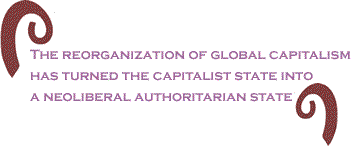
|
|||||||||||||||||||||||
 |

Custom Search
|
 |
Whither labor movement? Should
labor unions concern themselves solely with the wages and benefits
of their own dues-paying membership, or should they also care about
the plight of the unemployed? Should labor focus merely on conditions
of workers in the The authors of Solidarity Divided are Bill Fletcher, Jr., BlackCommentator.com Executive Editor and longtime activist, and Fernando Gapasin, Central Labor Council President and labor educator. Perhaps no two individuals are better equipped to provide a critique of labor’s mistakes, and offer solutions for the future of the movement. The troubling picture painted by Fletcher and Gapasin is of a labor movement that has been, as they articulate, “too pale, too stale, and too male” to address the everyday realities of working people and the poor. And the history of labor unions is one of missed opportunities and missteps, of acting too often as a cheerleader for predatory companies and policies and against the interests of labor, of allowing divide and conquer tactics to prevail at the expense of workers of color in the South and elsewhere, and of rubberstamping America’s foreign policy and antidemocratic tendencies toward empire building.
Much
to its credit, the book takes the reader through a history of labor
struggles in the
The
Right destroyed social movements in the Today, in a world of mortgage foreclosure mania, rising fuel costs, an eviscerated and decimated middle class, and the largest upward redistribution of wealth in history, a revitalized union movement is more crucial than ever. But are the unions up to the task? In order to remain relevant, the authors suggest, labor must move beyond the traditional construct of collective bargaining agreements, and become champions for socio-economic justice, racial and gender equality, environmental justice and immigrants’ rights. Under the new realities of this world, the traditional union tactics are rendered obsolete. The old constructs of labor organizing are wholly inadequate to address the now dominant form of global capitalism, a pernicious neoliberalism which places the U.S. at the top, lowers wages and eliminates other barriers to making profits, and responds to its critics by labeling them as terrorists and waging unilateral wars against them. The authors note that the reorganization of global capitalism has turned the capitalist state into a neoliberal authoritarian state, one which privatizes everything and eliminates the public sphere, uses state violence to quell dissent, and maintains a quasi-permanent state of siege. The post 9-11 regime of torture, spying and manufactured bogeymen is a manifestation of this mentality, but so too is the government’s callous response to the victims of Hurricane Katrina. And the failure to recognize and respond to these realities has placed unions on the sidelines. A new solidarity movement must form coalitions with other social justice organizations across borders, engage in a true class-based struggle, and understand the links between the interests of multinational corporations and American foreign policy. You must read Solidarity Divided. Fletcher and Gapasin provide a superior narrative of the road the labor movement has traveled, and chart the path it must now take for its own survival. BlackCommentator.com Editorial Board member, David A. Love, JD, is a lawyer
and journalist based in |
Any BlackCommentator.com article may be re-printed so long as it is re-printed in its entirety and full credit given to the author and www.BlackCommentator.com. If the re-print is on the Internet we additionally request a link back to the original piece on our Website. Your comments are always welcome. eMail re-print notice
If you send us an eMail message we may publish all or part of it, unless you tell us it is not for publication. You may also request that we withhold your name. Thank you very much for your readership. |
| |
| August 28, 2008 Issue 288 |
|
| Executive Editor: Bill Fletcher, Jr. |
| Managing Editor: Nancy Littlefield |
| Publisher: Peter Gamble |
| Est. April 5, 2002 |
Printer Friendly Version
in resizeable plain
text format or pdf
format. |

|
 |
 |
 |
| |
| |





































